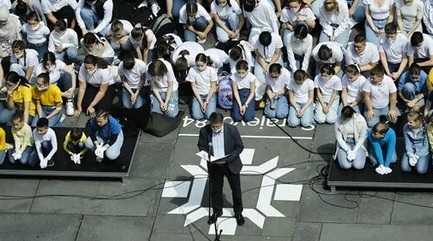
06 May 2023; AA: Bosnia and Herzegovina on Friday commemorated 1,601 children killed during the siege of Sarajevo between 1992 and 1995.
A memorial service was held in the capital with the same number of students, representing the child victims.
Fikret Grabovica, president of the Association of Parents of Children Killed during the siege of Sarajevo, said the perpetrators were not punished and none of them were even prosecuted.
We aim to explain that the evil experienced should not occur to anyone, and peace and freedom are important for everyone, he added.
President of the War Victims Association Amerisa Ahmetovic said more work is needed to strengthen the commemoration culture. "The important thing in all this is to tell our children, future generations, what happened, to tell them constantly, to warn against the evils that occurred in the war," he said.
The children drew attention to the massacre by covering their mouths with pieces of white cloth.
The 1992 Bosnian War started with Serbian troops' siege of Sarajevo and left over 100,000 people killed.
Serb forces erected barricades all over Sarajevo, and the situation deteriorated with the bombing of the city on April 6, triggering the 1,425-day siege.
Thousands of civilians were targeted in countless massacres during the siege that would last until Feb. 29, 1996.
Civilians endured daily bombings and mortar attacks by Bosnian Serb troops as shoppers in the market, people waiting in bread lines, and children playing in schoolyards were also targeted indiscriminately.
During the nearly four-year siege, 11,541 civilians, 1,601 of whom were children, were killed, while more than 50,000 others got injured, records show.
According to estimates, an average of 329 mortar shells were fired on Sarajevo every day, with more than 500,000 bombs dropped in total.
Historical and cultural artifacts, along with infrastructure, in Sarajevo, which has hosted many civilizations throughout history, were also damaged during the prolonged blockade.
The bloody war in Bosnia and Herzegovina ended on Nov. 21, 1995, at Dayton Air Base in the US state of Ohio, with the agreement of the Bosniak, Serb, and Croat sides.




